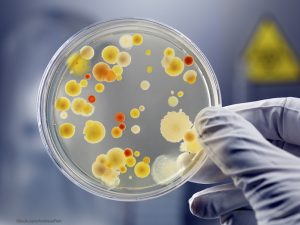Pathogenic bacteria are able to grow and defend themselves by forming biofilms. These clusters of bacteria communicate and the slime-enclosed aggregate help the bacteria defeat antibiotics. When the bacteria can form a biofilm in the human body, the infection will often become untreatable.
 Researchers in Ireland studied whether disinfectants can kill Salmonella bacteria in a biofilm in food processing facilities. The scientists used three disinfectants, and found it did not kill the Salmonella cells if the biofilm grew for 7 days before the disinfectant was applied. Even soaking the biofilm in disinfectant for 1-1/2 hours failed to destroy the bacteria.
Researchers in Ireland studied whether disinfectants can kill Salmonella bacteria in a biofilm in food processing facilities. The scientists used three disinfectants, and found it did not kill the Salmonella cells if the biofilm grew for 7 days before the disinfectant was applied. Even soaking the biofilm in disinfectant for 1-1/2 hours failed to destroy the bacteria.
The research began after a Salmonella Agona outbreak in Europe sickened 160 people, linked to meat from a major processing facility. Salmonellosis is the second most common cause of foodborne illness worldwide. And contamination of surfaces in food processing facilities is one of the ways this bacteria gets into our food.
It turns out that Salmonella is able to adopt a “specialized biofilm” on many different hard surfaces, such as stainless steel, glazed tile, plastic, and glass. Over time, that biofilm becomes denser and attaches more firmly to the surface. The scientists found “morphological differences between the biofilm formed at 48 hours and the biofilm formed at 168 hours.” Only sodium hydroxide killed the early biofilm, but no disinfectant eradicated the mature biofilm.
Since disinfectants can’t kill this biofilm, processors must be very careful to keep Salmonella out of their facilities. When Salmonella is established in a food facility, it persists despite thorough cleaning and chemical decontamination. The scientists think that the biofilm changes over time to provide more protection from harsh environmental conditions. More research is needed to find better ways to destroy Salmonella biofilms.




